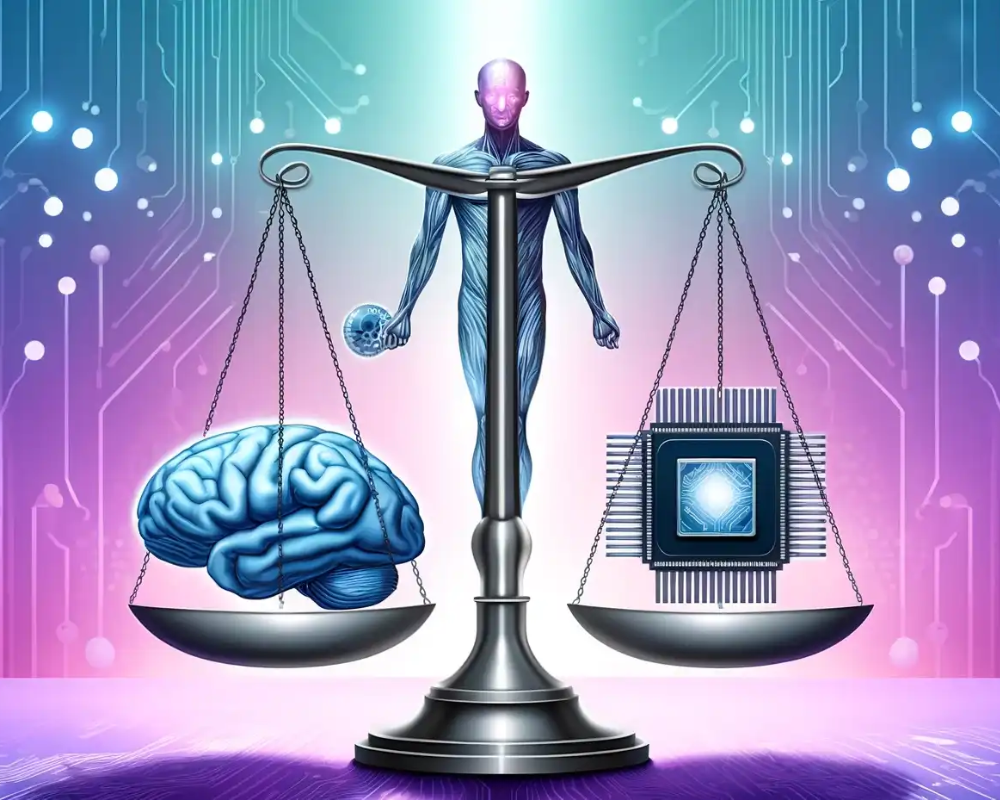AI and Ethics – The Challenges of Growing Technology
Artificial Intelligence (AI) has risen to prominence and brought countless benefits to society, but it also presents ethical challenges that need to be addressed. AI impacts a range of sectors, from healthcare to security, raising questions about privacy, control, and accountability. Here are the significant ethical challenges associated with the growth of AI technology, highlighting the key characteristics of each. Learn how to address these challenges and ensure that AI is used ethically and responsibly for the good of society.
Privacy and Surveillance
The first major challenge for ethics in AI is the issue of privacy and surveillance.
With the increasing use of AI in monitoring systems, the line between security and invasion of privacy becomes increasingly blurred.
Because AI algorithms can analyze large amounts of personal data without the user's knowledge.
In this way, it is possible to track people's habits, movements and behaviors, often without their explicit consent.
Additionally, AI systems can identify faces and individual features, facilitating mass surveillance.
Additionally, AI systems may use collected data for purposes not authorized by users, raising concerns about the misuse of this information.
Furthermore, the lack of clear regulation for the use of AI in public and private surveillance creates loopholes that can be exploited by companies or governments.
Ultimately, protecting people’s privacy in a world where AI increasingly monitors is a challenge that demands urgent action.
Bias and Discrimination
The second challenge of AI ethics is the risk of bias and discrimination.
Although AI algorithms are designed to be unbiased, they often reflect biases present in the data they are trained on.
Because AI systems learn from historical data, which often carries racial, social and gender biases.
In this way, algorithms can perpetuate discrimination in employment decisions, credit decisions and even criminal proceedings.
Furthermore, the lack of transparency in algorithms makes it difficult to identify and correct these biases.
Furthermore, correcting bias in AI systems requires a careful and ongoing approach, which is not always a priority for companies.
Furthermore, the increasing reliance on AI for important decisions could amplify these problems on a large scale, disproportionately affecting vulnerable groups.
It can also create a feedback loop, where biased decisions reinforce already biased data.
Finally, combating bias and discrimination in AI is essential to ensuring that the technology is used fairly and equally for everyone.
Responsibility and Accountability
The third ethical challenge is the issue of responsibility and accountability in the use of AI.
AI systems make increasingly complex decisions, making it difficult to determine who should take responsibility for errors or failures.
Additionally, AI algorithms operate in often obscure ways, which makes it difficult to assign blame when something goes wrong.
So if an AI makes a mistake in a medical or judicial decision, who should take responsibility?
Additionally, AI can make autonomous decisions without human intervention, which increases the complexity of determining accountability.
Furthermore, companies developing AI can avoid liability by claiming that the system is too complex for complete control.
This also raises questions about the use of AI in sensitive areas such as healthcare and justice, where mistakes can have serious consequences.
Finally, ensuring accountability in the use of AI is essential to prevent harm and protect people’s rights.
Autonomy and Control
The fourth ethics challenge is related to autonomy and control over AI.
As AI becomes more advanced, there is a growing risk that humans will lose control over the systems they create.
Because AI systems can learn and evolve in unexpected ways, making it difficult to predict how they will behave in future situations.
Thus, there is a real risk that AI will make decisions that are beyond human control, especially in areas such as defense and security.
Furthermore, over-reliance on AI in critical sectors may weaken the human ability to make informed decisions.
Furthermore, AI autonomy in areas such as autonomous vehicles and military drones creates an ethical dilemma about how much control humans should have.
It also raises the question of how far we can trust AI to make decisions that involve human lives.
Ultimately, maintaining human control over AI is crucial to ensuring the technology is used safely and ethically.
Impact on Employment
The fifth and final ethics challenge is the impact of AI on employment and labor relations.
As AI advances, many jobs are being automated, which could cause major changes in the job market.
Because AI can perform routine tasks more efficiently and cheaply than humans, leading to the replacement of workers in several industries.
Thus, job automation can increase unemployment, especially in sectors such as manufacturing, transportation and services.
Furthermore, the transition to an AI-dominated labor market requires mass reskilling of the workforce, which is not always accessible to everyone.
As well, social inequality may increase, with low-skilled workers being the most affected by automation.
Furthermore, companies that adopt AI at scale may prioritize efficiency over worker well-being, creating more precarious work environments.
It can also generate a new form of social exclusion, where those without access to technology are marginalized.
Ultimately, ensuring that the transition to an AI-powered economy is fair and inclusive is a challenge that needs to be carefully managed.
Conclusion
The ethical challenges of AI are vast and complex, but not insurmountable.
As technology continues to advance, it is essential that governments, businesses and society work together to create clear guidelines that ensure the ethical and responsible use of AI.
From privacy and surveillance issues to the impact on employment, all of the challenges discussed require solutions that balance innovation with social responsibility.
Only then can we ensure that AI contributes to human progress without compromising the fundamental values that underpin our society.
Ultimately, addressing the challenges of AI ethics is key to a more just and sustainable future.













